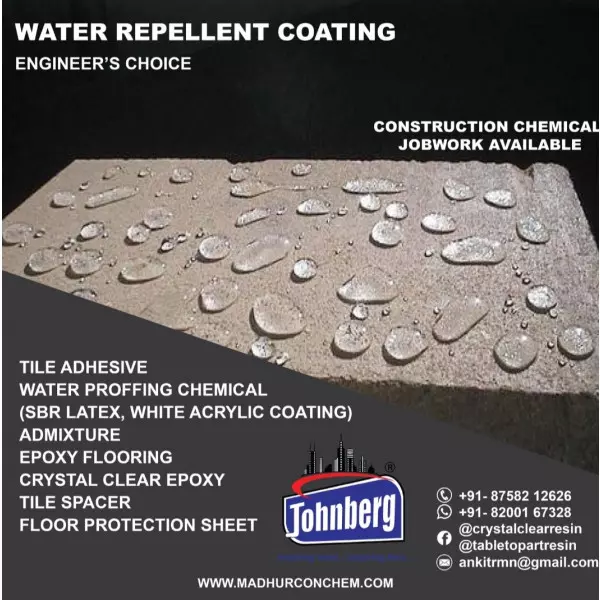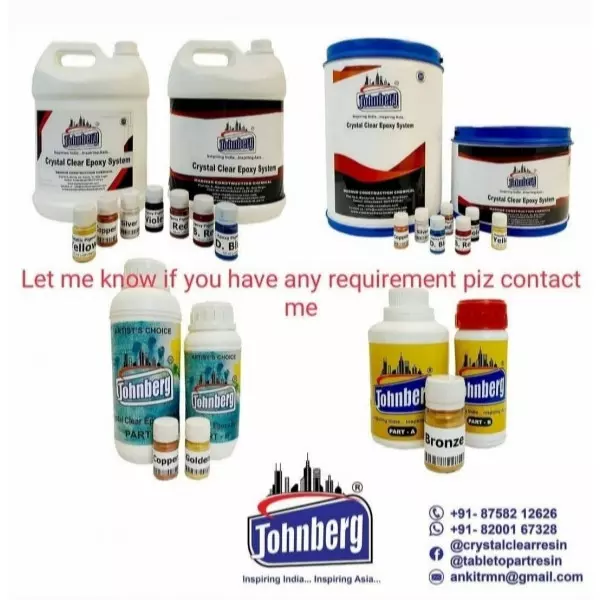- Home
- About Us
- Products
- Resin Furniture
- 3D Epoxy Flooring Service
- Resin Table Top
- Wooden Epoxy Resin Table Top
- Metallic Epoxy Flooring Service
- Conception Chemical Consultants
- Chemical Consultancy For Construction
- Construction Chemical Consultant
- Tile Grout
- Foundation Grout Consultant
- Paver Block Chemical Consultant
- Waterproofing Chemical Consultant
- Epoxy Pigment Consultant
- Heat Reflective Coating
- Water Repellent Coating
- Epoxy Grout
- Chemical Consultant
- Industrial Chemical
- Construction Chemical
- Epoxy Resin
- Epoxy Coating
- Polyester Resin
- Joint Sealants
- Cristal Clear Epoxy Resin And Hardner
- Construction Chemicals
- Polycarboxylate Ether And Liquid
- Solvent Cement
- Tile Protection Sheet
- Water Reducing Superplasticizer
- Epoxy Resin And Hardeners
- Two Component Waterproof Coating
- Epoxy Floor Coatings
- Casting Resin
- Sbr Latex Polymer
- Epoxy Grout Formulations
- Epoxy Resin Tabletops
- Tile Spacers
- Tile Levelling Spacers
- Industrial Night Vision Epoxy Grout
- Sbr Latex
- Johnberg Marble Polishing Liquid
- Acrylic Elastomeric Coating
- Weber Tile Adhesives
- Decorative Arts
- Resinic Crafts
- PU Flexible Tile Adhesive
- Resin Pressed Flowers
- Dry Pressed Flower
- Epoxy Putty
- Resin Furniture
- Services
- Updates
- Gallery
- Contact Us
Water Repellent Coating Manufacturers In Raipur
Details of Water Repellent Coating
Water repellent coating is a type of surface treatment applied to materials such as fabric concrete wood glass or metal to make them resistant to water It does not completely block water like waterproof coatings but instead reduces water absorption and allows water to bead and roll off the surface
Types of Water Repellent Coatings
1 Silicone Based Coating
Made from silicone compounds
Commonly used on textiles and concrete
Offers good resistance to water and weathering
2 Fluoropolymer Based Coating
Provides high performance water and oil repellency
Used on high end fabrics and industrial surfaces
3 Wax Based Coating
Natural or synthetic wax is used
Suitable for temporary protection of leather or canvas
4 Nanotechnology Based Coating
Uses nano particles to create a highly water repellent surface
Offers long lasting performance and transparency
Applications:
1 Construction
Applied on concrete bricks and tiles to prevent water seepage and reduce erosion
2 Textiles
Used on jackets tents and outdoor gear to repel rain and moisture
3 Automotive
Used on windshields and car bodies for better visibility and protection
4 Wood Treatment
Protects outdoor wooden furniture and structures from rot and mold
Benefits:
1 Reduces water absorption
2 Prevents mold mildew and staining
3 Extends material life
4 Maintains surface appearance
5 Enhances resistance to environmental damage
Limitations:
1 May wear off over time and need reapplication
2 Some coatings may affect breathability or appearance
3 Not suitable for full submersion in water
Offered Product
Water Repellent Coating
Packaging Size10 KgPackaging TypeContainerColorTransparentAgents For Water RepellentSiliconeShelf Life24 MonthCoverage1.2 Sq MBrandjohnbergMaterialLiquid Polymerwe Provide Technology To Provide Manufecture Water Repelant Coating, And Construction Chemical. ... Read moreWaterproofing Chemical For Terrace
When It Comes To Waterproofing A Terrace, There Are Various Chemicals And Materials Designed Specifically For This Purpose. Here Are Some Of The Most Common Waterproofing Chemicals Used For Terraces:1. Liquid Waterproofing Membrane (LWM)Example: Dr. Fixit, Pidilite, And Sika Offer High-quality Liquid Waterproofing Solutions.Use: These Products Are Easy To Apply By Brush Or Roller, Creating A Seamless, Flexible, And Waterproof Membrane Over The Terrace. They Are Excellent For Flat Roofs. Continue
Best Waterproofing Chemical Manufacturer In Ahmedabad
Waterproofing Chemicals Are Designed To Create A Barrier That Prevents Water From Penetrating Surfaces Such As Concrete, Wood, Stone, And Masonry. These Chemicals Are Used In Construction, Home Improvement, And Industrial Applications. Below Are Some Common Types Of Waterproofing Chemicals And Their Details:1. Cementitious WaterproofingComposition: Made Of Cement And Additives That Improve Its Adhesive Properties.Usage: Primarily Used For Waterproofing Concrete Surfaces.Properties: Easy To App Continue
Waterproofing Chemicals Manufacturers In Ludhiana
Water Repellent Coating DetailsWater Repellent Coating Is A Protective Layer Applied To Surfaces To Prevent Water From Penetrating. It Is Commonly Used On Materials Like Fabric, Concrete, Glass, Wood, And Metal To Improve Durability And Maintain Appearance.Types Of Water Repellent CoatingsSilicone Based Coatings These Coatings Create A Hydrophobic Layer That Repels Water. They Are Flexible And Long Lasting And Are Often Used On Textiles And Outdoor Gear.Fluoropolymer Based Coatings The Continue




